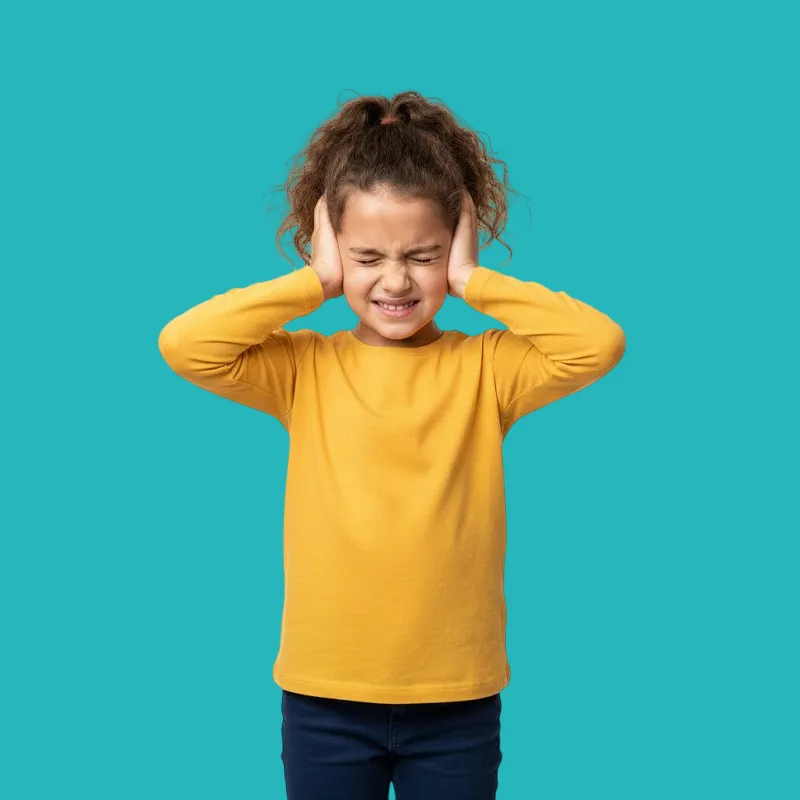Tinnitus in children is a bothersome problem that affects a child's concentration and daily comfort. It may manifest as a whistling or buzzing sound without any external source.
Parents need to understand its causes and how to deal with it correctly to protect their child's hearing and maintain their health.
What is tinnitus in children?
Tinnitus in children manifests as sounds the child hears internally without an external source, including:
- A continuous whistling sound in the ear.
- A clicking or pulsating sound.
- A feeling of light wind.
- Distraction or anxiety due to the internal sound.
Causes of tinnitus in children

The causes of tinnitus are related to several factors that affect the ear and hearing, such as:
- Middle ear infections that cause congestion and pressure.
- Wax buildup and ear canal blockage.
- Prolonged exposure to loud noises.
- Deficiencies in important vitamins such as vitamin B12 and iron.
Symptoms of Tinnitus in Children
The symptoms of tinnitus in children vary depending on the cause and the intensity of the sound. Some symptoms include:
- Complaints of an internal whistling sound.
- Difficulty concentrating or sleeping.
- Sensitivity to external noises.
- The child trying to cover their ear to avoid the noise.
How Tinnitus is Diagnosed
Diagnosing tinnitus depends on a comprehensive evaluation by a doctor, which may include:
- Examining the ear to check for inflammation or wax buildup.
- Hearing tests to determine if there is any hearing loss.
- Examining the nose and throat to check for congestion.
- Ordering further tests if the tinnitus persists.
Treatment of Tinnitus in Children
Treatment for tinnitus in children focuses on treating the underlying cause. This may include:
- Cleaning the ear to remove wax using a safe, medical method.
- Treating ear infections with antibiotics or ear drops.
- Using nasal sprays if there are problems with the Eustachian tube.
- Reducing exposure to loud noises.
When Should You See a Doctor?

In some cases, tinnitus is a warning sign that requires a doctor's visit, such as:
- Tinnitus lasting more than two days.
- Dizziness or hearing loss.
- Severe ear pain in the child.
- Tinnitus occurring after a fall or a strong blow.
Complications of neglecting tinnitus
Neglecting tinnitus can lead to several serious problems, including:
- Hearing loss over time.
- Distraction and impact on academic performance.
- Development of chronic ear infections.
- Anxiety and stress in the child.
Tips for preventing tinnitus
Prevention helps reduce the likelihood of developing tinnitus, as follows:
- Avoid loud noises and headphones.
- Treat colds and congestion early.
- Do not use sharp objects to clean the ears.
- Consume a diet rich in vitamins important for hearing.
The role of nutrition in reducing tinnitus
Nutrition plays an important role in alleviating tinnitus, including:
- Foods rich in vitamin B12.
- Iron-rich foods support healthy blood.
- Drink plenty of water.
- Reduce sugar intake, which can increase inflammation.
Frequently Asked Questions
Is tinnitus normal in children?
It may occur temporarily, but if it persists, a medical examination is necessary.
Is tinnitus in children related to ear infections?
Yes, ear infections are among the most common causes of tinnitus.
Can tinnitus recur in children?
Yes, if the underlying cause is not treated or if there is exposure to loud noises.
Do vitamin deficiencies cause tinnitus in children?
A deficiency in vitamin B12 and iron may lead to tinnitus in some cases.
Article Summary
Tinnitus in children is a common condition that can cause discomfort and affect concentration and sleep. It often arises from ear infections, wax buildup, or exposure to loud noises.
Early diagnosis and proper treatment can help eliminate tinnitus and prevent complications. Prevention and a healthy diet remain essential for maintaining a child's ear health and comfort.